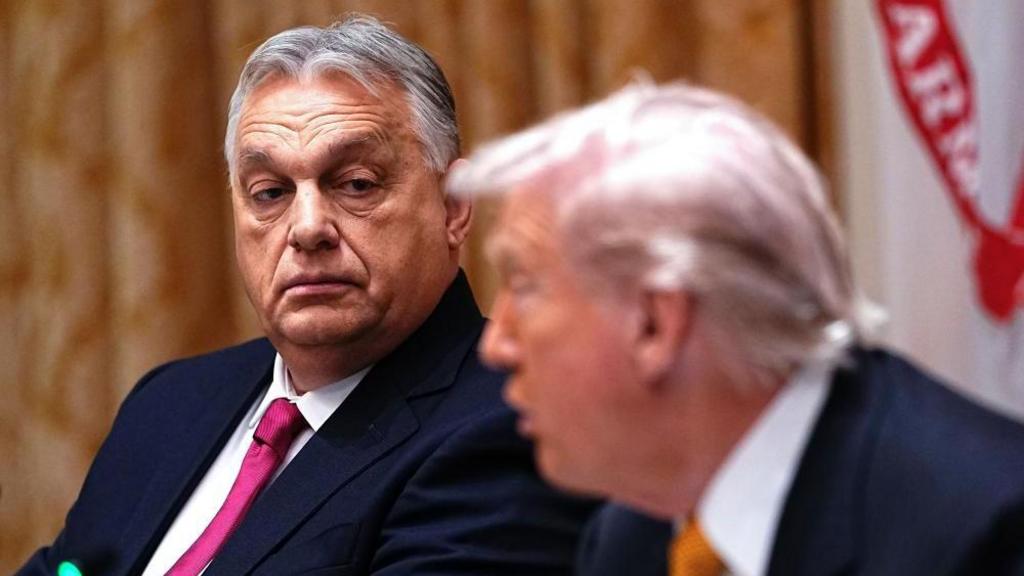“`html
At first glance, the Hungarian prime minister’s visit to Washington appears to have achieved its primary objectives: securing favorable endorsements and exemptions from sanctions affecting Russian oil, gas, and nuclear supplies.
This perceived success comes just five months ahead of a challenging election.
However, a closer examination reveals a more nuanced reality. The U.S. delegation negotiated a rigorous trade agreement, potentially at a significant cost to Hungary.
Furthermore, progress remains elusive on Viktor Orban’s foremost concern: resolving the conflict in neighboring Ukraine and mitigating its far-reaching consequences for Hungary.
A key accomplishment for Orban was an exemption from U.S. sanctions. A White House official indicated to the BBC that this exemption is time-limited to one year, while Hungary’s Foreign Minister, Péter Szijjártó, asserted it would be indefinite.
The duration of this exemption is noteworthy, as it aligns with Trump’s apparent desire to bolster his ally’s prospects in the upcoming April election. This exemption also partially corresponds with the European Commission’s call for all member states to cease importing Russian oil, gas, and nuclear fuel by the end of 2027.
From an EU standpoint, what remains absent is a firm political commitment from Orban to meet this demand, a commitment already made and fulfilled by the Czech government. The EU is actively pursuing stricter energy sanctions, much to the discontent of Hungary and Slovakia.
Away from public attention, Hungarian energy company MOL has been upgrading its refineries in Százhalombatta, Hungary, and Bratislava (Slovnaft facility) to process Brent crude instead of the high-sulphur Urals crude supplied through Russian pipelines.
MOL announced on Friday that 80% of its oil requirements could be imported via the Adria pipeline from Croatia, although this would entail higher logistical expenses and technical uncertainties.
Thus, Orban’s argument, which resonated with Trump, that Hungary, as a landlocked nation, has no alternative to Russian oil, may not be entirely accurate.
Collectively, Hungary and Slovakia have disbursed $13 billion to Russia for its oil between the commencement of its full-scale invasion of Ukraine in February 2022 and the close of 2024.
The one-year reprieve granted by the U.S. nonetheless provides valuable relief for Hungarian households this winter.
Orban informed pro-government reporters accompanying him to Washington that, without the exemption, utility bills “could have gone up by up to three times in December.” Capping these bills has been a cornerstone of his popularity in Hungary since 2013.
Under the U.S. exemption, Hungary can also continue purchasing Russian gas via the Turkstream pipeline, which traverses the Balkans, and remit payments in hard currency ($185 million in August alone) through a Bulgarian loophole. Orban has reportedly agreed to buy LNG from the U.S. worth $600 million, according to Bloomberg.
Nuclear energy constitutes another pivotal aspect of the Washington agreement.
Hungary has committed to procuring U.S. nuclear fuel rods for its Paks 1 nuclear power station (at a cost of $114 million), in addition to those acquired from Russia’s Rosatom and France’s Framatome.
Russian plans to finance and construct the nuclear extension, Paks 2, have been protracted by technical and licensing hurdles. The U.S. agreement to lift all nuclear sanctions on Hungary may facilitate the resumption of that project, but significant challenges persist.
Hungary has also agreed to purchase U.S. technology to extend the short-term storage of spent nuclear fuel at Paks for an estimated $100 million to $200 million.
Perhaps the most substantial component of the deal involves Hungary’s commitment to buy up to 10 small modular nuclear reactors from the U.S., at a cost ranging from $10 billion to $20 billion.
Hungary requires electricity to power the vast Chinese battery plants under construction throughout the country. Smaller nuclear plants are less susceptible to construction delays and easier to license.
Lastly, discussions are underway regarding a currency swap agreement – akin to a recent U.S.-Argentina deal to bolster the peso – wherein U.S. and Hungarian central banks can exchange currency.
This arrangement would allow the U.S. central bank to supply dollars to Budapest in the event of a future financial crisis in Hungary, thereby enhancing financial stability.
In summary, Hungary secured a deal to purchase U.S. gas, nuclear energy, and unspecified weapons systems in exchange for a temporary waiver from U.S. sanctions on Russian oil and gas.
However, it failed to reinstate the U.S.-Hungary dual taxation system, abolished in 2022, which impedes bilateral trade. Furthermore, it did not secure a new date for a potential Trump-Putin summit in Budapest as part of efforts to resolve the Russia-Ukraine conflict.
Critics contend that energy dependence on Russia is merely being replaced by energy dependence on the U.S. The Orban government maintains that it is achieving greater diversification of supply.
“`

